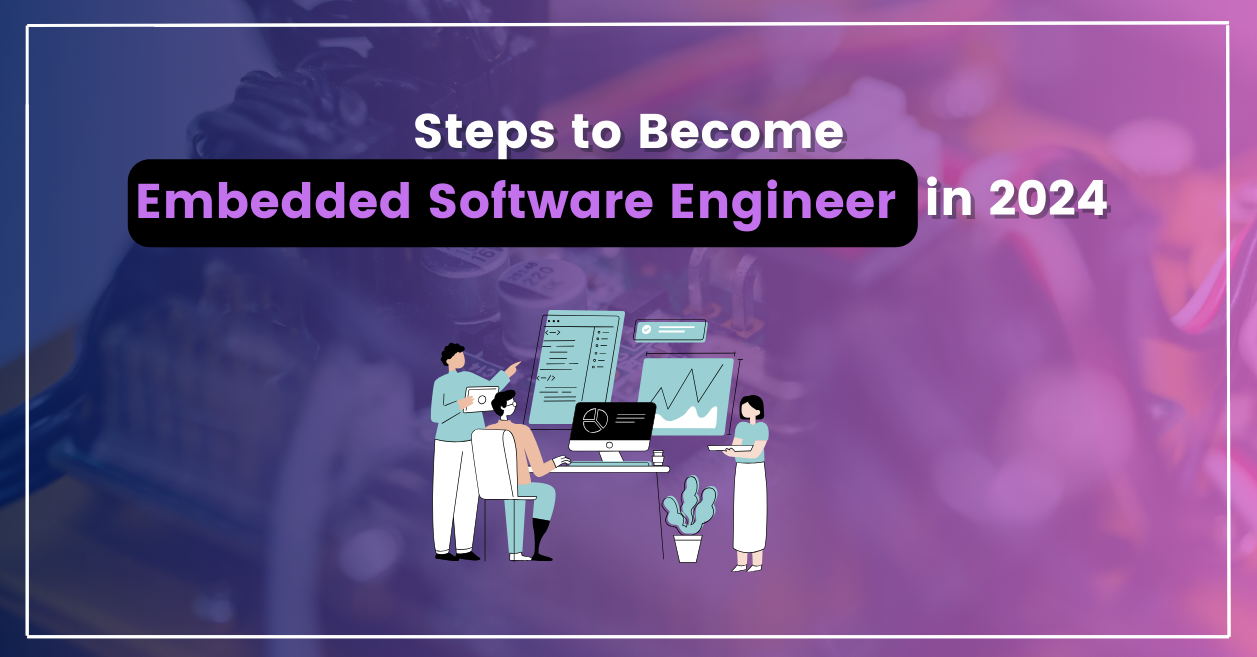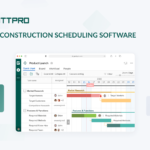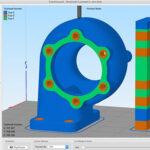To become an Embedded Software Engineer, you need to obtain a degree in computer science, computer engineering or electrical engineering and gain hands-on experience with both hardware and software through courses or on-the-job training. Embedded software engineering is a rapidly growing field, with a wide range of job opportunities available.
From creating software for medical devices and automobiles, to developing virtual assistants and consumer electronics, there is a high demand for skilled engineers in this field. However, becoming an embedded software engineer requires a specific skill set and educational background.
We will explore what it takes to become an embedded software engineer, including the education, experience, and soft skills needed to succeed. We will also explore the pros and cons of working in this field, as well as the average salary and job outlook for embedded software engineers.

Credit: m.youtube.com
Steps To Become An Embedded Software Engineer
If you aspire to become an embedded software engineer, obtaining a degree in computer science, computer engineering, or electrical engineering is recommended. Additionally, learning C programming, mastering embedded software programming, and acquiring industry-specific technical skills are crucial. Continuous learning and honing your soft skills for effective communication are also important for a successful career in this field.
Getting started on a career in embedded software engineering can be a challenging but rewarding process. Here are some essential steps to help you become an expert in this field:Learn C
C programming is the foundation of embedded software engineering. Before aspiring to become an embedded software engineer, you must learn C. C is a powerful programming language used to build complex applications that run on microcontrollers. It would help if you mastered C before moving on to other programming languages.Code In C
After learning C, start coding in C. Practice coding in C every day to improve your skills. Develop your own projects instead of just following tutorials. In this way, you will start learning how to use C in practical applications.Start With Arduino
Starting with an Arduino microcontroller is a great way to learn programming in C and its application in embedded systems. Arduino is an open-source platform with a robust community of developers. It has an easy-to-use software development environment and a wide range of sensors and modules that you can use to create your projects.Join Arduino Community
Getting involved in the Arduino community is a great way to learn from experienced developers. You can participate in online forums, attend workshops or meetups. This will give you an opportunity to interact with other developers, share and get feedback on your projects.Explore Microcontrollers
There are many microcontrollers available on the market, such as Atmel, TI, and ARM. Explore various microcontroller options, read datasheets, and learn how to program them in C. Microcontrollers are at the heart of the embedded system, so better understanding of them will help you develop efficient systems. By following these steps and continuously practicing, you can become an expert in embedded software engineering.Important Skills For Embedded Software Engineers
Becoming an embedded software engineer requires technical skills such as C programming and understanding microcontrollers, as well as soft skills such as problem-solving and communication. A degree in computer science, computer engineering, or electrical engineering is typically necessary, with opportunities for hands-on experience through certificate programs available.
As technology continues to evolve, the demand for embedded software engineers has increased significantly. Embedded software engineers are responsible for designing, implementing, and maintaining software solutions that operate hardware components in a range of devices. A successful embedded software engineer must possess various skills such as a project mindset, embedded software programming, understanding documentation, and soft skills. In this article, we’ll take an in-depth look at each of these skills to help you become a successful embedded software engineer.Project Mindset
A project mindset is one of the essential skills that a successful embedded software engineer must-have. It involves a combination of excellent project management skills, problem-solving skills, and a strong focus on delivering results. As an embedded software engineer, you should be comfortable working within project constraints such as timelines, budget, and resources. You’ll also need to be proactive in identifying potential challenges upfront and coming up with viable solutions to overcome them.Embedded Software Programming
Embedded software programming is another critical skill that you must possess as an embedded software engineer. As an embedded software engineer, you’ll need to have an excellent understanding of programming languages and be proficient in at least one programming language such as C or C++. You will also need to keep up-to-date with emerging software technologies and be able to integrate them into your projects successfully.Understanding Documentation
The ability to understand documentation is a crucial skill for any embedded software engineer. Embedded systems typically have detailed documentation that specifies their hardware and software behavior. As an embedded software engineer, you must be comfortable reading and interpreting documentation such as specification sheets, user manuals, and schematics. Knowing how to read documentation will help you to understand the system requirements and correctly implement them.Soft Skills
Finally, soft skills are an essential part of being a successful embedded software engineer. Soft skills can include communication, teamwork, problem-solving, and time management skills. You’ll need to be able to work effectively with other members of the project team, including hardware engineers, product managers, and other software engineers. Good communication skills will also help you to share your ideas effectively and explain complex technical concepts to non-technical stakeholders. In summary, becoming an embedded software engineer requires a combination of technical and soft skills. You’ll need a project mindset, be proficient in programming languages, understand documentation, and possess excellent soft skills to succeed in this field. Keep in mind that this is a constantly evolving field, and you’ll need to stay up-to-date with the latest technologies and trends to remain competitive.Pros And Cons Of Embedded Software Engineering
As with any career, there are both pros and cons to pursuing a career in embedded software engineering. The average salary for an embedded software engineer is quite high, making it a lucrative field to explore. However, there may be limited opportunities for remote work and the problem-solving required can be complex and stressful.
With the right education and skill set, though, becoming an embedded software engineer can be a rewarding and challenging career.
Pros Of Embedded Software Engineering
Embedded software engineers enjoy several advantages that make the job appealing. Firstly, the average salary for embedded software engineers is generally high. According to Payscale, the average salary for an embedded software engineer in the United States is about $84,600 per year. Secondly, embedded software engineering is a highly specialized field with fewer people pursuing it. Consequently, there is high demand for skilled professionals, making it easier for new graduates to find employment opportunities. Thirdly, embedded software engineers get the opportunity to work on exciting projects, such as building complex systems, working with cutting-edge technologies, and collaborating with top-notch professionals in various industries.Cons Of Embedded Software Engineering
However, like any other profession, there are also some downsides to being an embedded software engineer. Firstly, there are fewer opportunities for remote work compared to other software development jobs. Since many embedded systems require strict testing and debugging, a physical presence is often necessary. Secondly, embedded software engineering comes with tight constraints, making it challenging for engineers to modify or upgrade the system once it is developed. In addition, with complex and challenging problems to solve, embedded software engineers can experience high levels of stress and pressure. Lastly, this field can come with long work hours, including some instances of working on weekends or holidays, leading to a poor work-life balance. In conclusion, becoming an embedded software engineer requires specialized training and knowledge of computer science, computer engineering, or electrical engineering. While embedded software engineering can be a rewarding career with high salaries, exciting projects, and plenty of challenges to tackle, it also comes with some cons that job seekers should consider. Regardless of the pros and cons, it is crucial to take the right steps to develop the necessary skills, stay up-to-date with industry trends, and build an impressive portfolio of work to succeed as an embedded software engineer.
Credit: www.electronicscuriosities.com
Prerequisites For Becoming An Embedded Software Engineer
To become an Embedded Software Engineer, a degree in computer science, computer engineering, or electrical engineering is preferred. Acquiring hands-on experience in both hardware and software is also important. Pursuing an undergraduate or graduate degree in software development or a related field can help gain the necessary knowledge and skills for this career path.
Degree In Computer Science, Computer Engineering, Or Electrical Engineering
To become an Embedded Software Engineer, having a degree in Computer Science, Computer Engineering, or Electrical Engineering is essential. While there is sometimes an opportunity to learn about hardware and software on the job, a degree in any of these fields will provide a strong foundation in the concepts necessary to excel in Embedded Software Engineering.Certificate In Embedded & Real-time Systems Programming
In addition to earning a degree, a Certificate in Embedded & Real-Time Systems Programming can be immensely helpful for aspiring Embedded Software Engineers. Such a certificate program will provide hands-on experience with both hardware and software. This experience can help aspiring engineers have a better understanding of how the software interacts with hardware and the unique challenges of embedded software development. To excel in this field, one must have a strong understanding of both software and hardware. A Certificate in Embedded & Real-Time Systems Programming can provide students with invaluable experience in embedded systems development. In conclusion, to become a successful Embedded Software Engineer, one must have a strong educational foundation in Computer Science, Computer Engineering, or Electrical Engineering, and hands-on experience with both hardware and software through a Certificate in Embedded & Real-Time Systems Programming. By acquiring these prerequisites, aspiring engineers can hone their skills and build a promising and rewarding career in Embedded Software Engineering.How To Get Started And Gain Experience
To become an embedded software engineer, you can start by learning C programming and then move on to embedded software programming with a project mindset. Focus on reading documentation and developing soft skills. While a degree in computer science or electrical engineering is preferred, there are also opportunities for learning on the job or through hands-on experience programs.
Pursue An Undergraduate Or Graduate Degree
The first step to becoming an embedded software engineer is to get your degree in computer science, computer engineering or electrical engineering. Not only do these degrees provide you with a solid foundational knowledge of coding, but they also offer the opportunity to learn about hardware and software. Additionally, getting a degree in any of these fields will give your resume the required boost to get noticed by employers.Participate In Software Or Firmware Internships
Getting an internship in software or firmware gives you hands-on experience and is a great way to enhance your practical skills. Internships provide opportunities to work on real-world projects, build a professional network, learn how to work within a team, and get invaluable experience that employers look for in candidates. You can also get certification through internships that will add weight to your resume and make you a more attractive candidate.Join Embedded Systems Community
Joining an Embedded Systems community is an excellent way to network and stay current on the latest industry trends. Online groups exist to share various industry resources and knowledge, forums for asking technical questions. Engineers from all over the world interact in such communities, sharing their ideas, and discussing the latest technological advancements in the field. Joining such communities can provide you with mentorship while you learn from the experience of other engineers troubleshooting with them, making you a more effective engineer. In conclusion, if you aspire to be an embedded software engineer, start by pursuing an undergraduate or graduate degree, participating in software or firmware internships, and joining an Embedded Systems community. This continuous learning and networking ensure that you are always up-to-date with the latest industry trends and developments, making you an asset to any organization you work for.Tips For Becoming A Successful Embedded Software Engineer
Becoming a successful embedded software engineer requires learning to code in C, starting with Arduino, and focusing on a project mindset. It’s also important to develop soft skills, such as communication and teamwork, and stay current with industry trends and best practices.
A degree in computer science, electrical engineering, or computer engineering is typically required, but hands-on experience and additional certifications can also enhance career opportunities.
Introduction: Embedded software engineering is an exciting field that is in high demand. If you’re interested in becoming an embedded software engineer, there are some tips you should follow to succeed in this field. In this blog post, we will share some essential tips that will help you become a successful embedded software engineer. H3: Understand Industry Trends To become a successful embedded software engineer, you need to be familiar with the latest industry trends. Monitoring the latest advancements in hardware and software technologies will help you stay ahead of the curve. Regularly scan industry blogs, publications, forums, and social media platforms to keep up to date with the latest trends. By keeping up with new trends and developments, you can make more informed decisions about the direction of your work. H3: Continual Learning and Improvement Embedded software engineering is a fast-paced discipline, which means you must continually improve your skills, knowledge, and abilities to meet the demands of the industry. Continuing your education by taking courses, attending conferences or workshops, and participating in industry meetups can help you continuously improve. With the rapid evolution of technology, it’s essential to keep up with the latest programming languages, tools, framework, and best practices to stay relevant in the industry. H3: Collaboration with Industry Professionals Collaborating with other professionals in the industry is a great way to advance your career. Networking with software engineers, hardware engineers, manufacturers, and other professionals in your industry can help you build relationships that can pay off later. Working together to solve complex problems can help you learn new skills, gain insights, and even lead to new job opportunities. To summarize, understanding industry trends, continual learning and improvement, and collaboration with industry professionals are key to becoming a successful embedded software engineer. By implementing these tips, you can stay ahead of the curve, continually improve your skill set, and build relationships with people in the industry that can help you advance your career.
Credit: m.youtube.com
Frequently Asked Questions On How To Become An Embedded Software Engineer
What Do You Need To Be An Embedded Software Engineer?
To become an embedded software engineer, you typically need a degree in computer science, computer engineering, or electrical engineering. While some on-the-job learning is possible for hardware and software, a Certificate in Embedded & Real-Time Systems Programming can provide hands-on experience to gain knowledge and skills needed for the job.
How Long Does It Take To Become An Embedded Engineer?
It typically takes a degree in computer science, computer engineering, or electrical engineering to become an embedded engineer. While there’s a chance to learn on the job, a certificate in Embedded & Real-Time Systems Programming can provide hands-on experience with both.
Do Embedded Software Engineers Get Paid Well?
Yes, embedded software engineers typically get paid well with an average salary range of $75,000 to $150,000 per year depending on their experience, expertise, and location. They usually hold a degree in computer science, computer engineering, electrical engineering, or have hands-on experience with both hardware and software.
However, this profession also comes with cons such as limited remote work opportunities, tight constraints, and dealing with complex problems.
What Degree Do You Need To Be An Embedded Systems Engineer?
To become an embedded systems engineer, you need a Bachelor’s degree in electrical engineering, electrical and computer engineering, computer science, or equivalent. Some opportunities to learn about hardware and software can be gained on the job, but a Certificate in Embedded & Real-Time Systems Programming can provide hands-on experience.
Conclusion
Becoming an embedded software engineer requires hard work, dedication, and a passion for technology. While a degree in computer science or engineering can be a great foundation, it’s important to also focus on developing essential programming and project management skills.
Continuous learning and practice will also be crucial in staying up-to-date with the latest technologies and staying competitive in this field. With the right mindset, education, and experience, you can become a successful embedded software engineer and enjoy the rewarding and fulfilling career that comes with it.












Leave a Reply